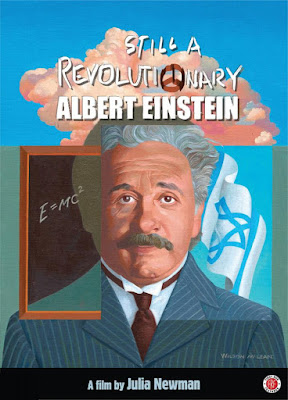Albert Einstein: Still A Revolutionary is Timely in Black Lives Matter Era
"Many people don't realize that Albert Einstein was at the forefront of racial equality in the United States. It pained him to see the plight of African Americans."
-Michio Kaku, Prof of Physics, City College NY
Theoretical physicist and Nobelist Albert Einstein, famous for the equation E = mc2 and developing the theory of relativity, was greeted like a rock star when he appeared in public. He was a modest, unassuming celebrity and yet clearly the limelight suited him.
In a new docudrama available for purchase on DVD, producer-director Julia Newman paints an elegant if at times frustrating portrait of the enigma scientist from Germany. He was Jewish and to hear her narrators tell it, gradually more fascinated with his own Jewishness. He had two wives (his physics student Mileva and then his cousin, the more matronly Elsa) but was a notorious womanizer, more or less sugarcoated in the film. He is shown to be a jerk in his treatment of wife one with a list of rules required to stay in his household, however. And his lapses are alluded to in a quote where he compares himself unfavorably to someone with a long-lasting marriage.
The film is relevant today because despite his personal peccadilloes, Einstein's life was punctuated by not only scientific breakthroughs such as that led to the atomic age, but morality. "Only morality in our actions can give beauty and dignity to life," he is quoted as saying in the film. His heroes included the 17th century philosopher Spinoza and Newman shows how that admiration colored his pantheistic religious views.
Our protagonist spoke out on a range of issues in his lifetime - ranging from women's rights and racism to immigration and nuclear arms control. He was disgusted by the lynchings and other signs of racism in America in the 20th Century.
"Many people don't realize that Albert Einstein was at the forefront of racial equality in the United States. It pained him to see the plight of African Americans," says the noted physics professor Michio Kaku, of City College New York, in the film. He said, "He was outraged by racism."
Ditto the class system, which he despised, and apparently loved children, ice cream and the common man and woman in equal measure. Americans ate up his good-natured sense of humor when he appeared here, though to hear the film's commentators tell it, the persona was something of a ruse. He turned the charm off and on at will.
He had endless curiosity and was noted for being a pacifist, what he called a "militant" pacifist. He was a Jew who fled the Nazis and then stood up for his people after the war.
Using archival footage, correspondence, and a range of interviews including with a young European Jew whose life was saved by Einstein's intervention, "Albert Einstein: Still a Revolutionary" hits a lot of interesting notes. The cinematography, rare clips and editing are top-notch.
I would recommend reading more about Einstein including his fabulous quotes such as:
"If you can't explain it simply,
You don't understand it well enough."
"Imagination is more important than knowledge. Knowledge is limited. Imagination encircles the world."
Photo: Used with permission, First Run Features. Julia Newman is a Brooklyn-based filmmaker with a previous, award-winning documentary, Into the Fire: American Women in the Spanish Civil War, portrayed the American medical workers and journalists who served in the first fight against Fascism. The film was broadcast on Public Television and Spanish Television and is distributed in the U.S. by First Run Features. The film is available for purchase online including on Amazon.




Comments
Post a Comment